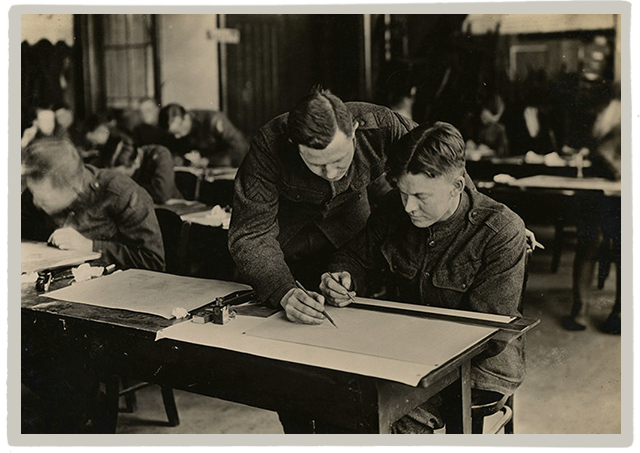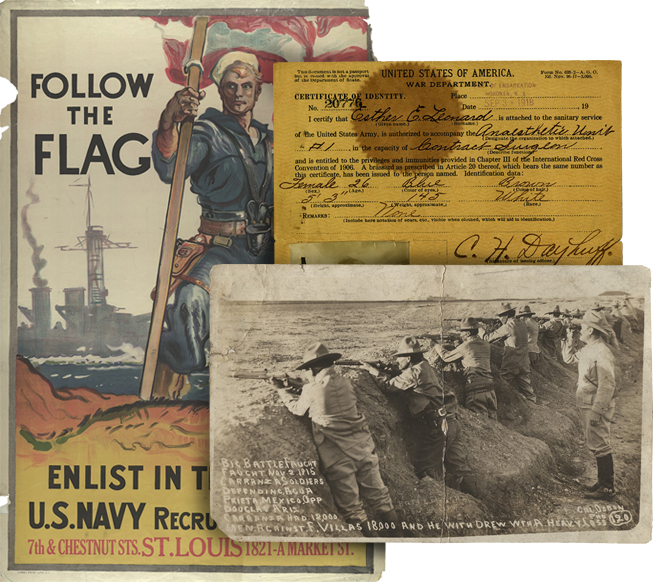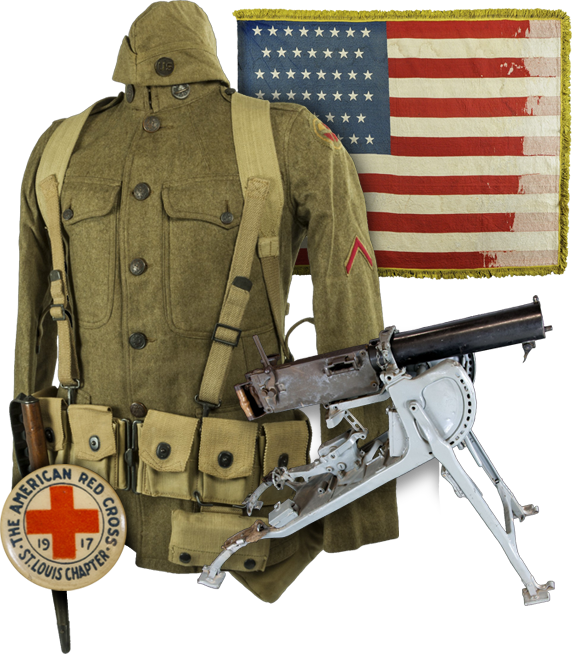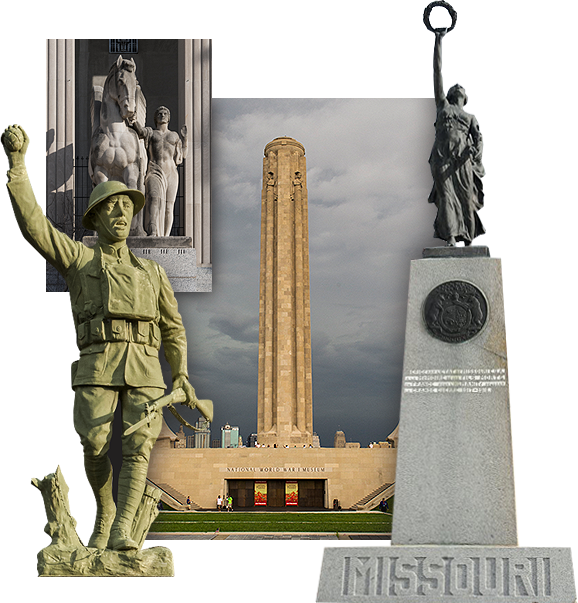William Robiner letter to Dr. Henry Milton Whelpley - June 1, 1918

Transcript
Hospital Unit 14. Box E. Old. Detention Great Lakes Illinois June 1, 1918. Dr. [Henry Milton] Whelpley, Editor Meyer Brothers Druggist St. Louis [Missouri] My Dear Dr. Whelpley, Undoubtedly you are under the impression, that I am at Camp Funston, where all the drafted boys of St. Louis are stationed. Fortunately I am not. After a long struggle with the draft board, I was excused on the grounds that I wanted to join the Navy, so here I am. This is my ninth day in service, and about liking it is self explanatory: so far so good. I do not know very much about Navy now

Transcript
[page 2] so I can not tell you very many things about it, the reason is this: We are capt in detention for 21 days until three typhoid injections are given to each recruit and also must each recruit be vaccinated once, twice or even three times, but if the third vaccination does not effect him they usually leave him go unles in special cases some one perhaps vaccinated another time. I already received two typhoid injections or 2 Shots in navel phrosiology also have I been vaccinated twice. I have met quite a few of my old friends here all of which are from Peoria Illinois, one of them especially is worth while mentioning here, namely Dr. R.C. Bradly one of the most prominent physicians of Peoria, who is in the service a little over a year, and is assistant surgent of the U.S.N.R.F.

Transcript
[page 3] I enlisted to the Navy with the rating of Hospital apprentice Second Class, But all rated men are not placed to their branches of service until the 21 days of their detention is over. The detention men are practically like quaranteened; they are not even allowed to go outside of their camp. Great Lakes Training Station consists of about 12 camps or more. Fortunately it is not applied to me. Out of all the hospital apprentices of my company #172 or Even other companies that I know (about) of in the Old Detention camp, I was about the only one transferred to the hospital department to serve my detention, and I have a special Hospital Pass to addmit me to every camp. There were men from about six or seven different states in my company, and of each of these states there was one or two registered pharmacists, but Missouri furnished three of them, however I was the

Transcript
[page 4] only one of them who was a graduate from a college of pharmacy. I would like to draw up a little narration of the pharmacists in the Navy and the conduct of pharmacy in the U.S. Navy, but as I am only the third day in the hospital service and have not yet acquainted myself with the environments of the Hospital Units of the U.S.N.S. I decided to wait and then write up a long history about same. Although I know quite a bit of what I have seen so far, but I think that a little delay will give me a better inside on the subject. I am surely sorry that I have to postpone that, because I promised to give you an outline upon the subject. as I know you are very interested in that profession and moreso for the good of that profession, and above

Transcript
[page 5] all for the best that this profession can possibly offer to its patrons. for humanity sake. Especially in this great crisis, to our boys who fight for our liberty. One can easily judge by the hard work that you have done in regard to the Edmond’s Bill. Of course it is not the falt of the workers that the Edmonds Bill did not go through. We all know at least one thing, the Faculty and officials of the St. Louis College of Pharmacy have done their best in regards to the passing of that bill, and this is one reason why I shall try to keep you posted as much as it will be possible for me to do so, in order you should know all the conditions existing in the Naval Pharmacy and its supervisors and the Good it offers to our patriotic Doctors and soldiers who are willing to sacrifice their lifes for liberty. As mentioned above, that I am not prepared presently to say anything about pharmacy and pharmacists in the Navy, I shall briefly describe the senatation of the Navy kitchens, so called

Transcript
[page 6] galley’s. Even though it may not be of any interest directly to pharmacy, but we have to admit that it is a very important part of our life, not only for the sake of the stomach, but as we say: the quickest way to reach a human heart is through the stomach. Regardless of what may follow about pharmacy latter on, I can say one thing that the galleys are surely kept in in the most sanitary conditions. The food is good, fresh, holesome, well tasting, and plentiful of it. Fortunately I do not have to work in the galleys, but through certain special privilages I occasionally obtain permission to visit them for the sake of knowledge in regard to the preparation of our food.

Transcript
[page 7] As I finished writing the last sentence of thy sixth page of this letter, Mr. Curran one of My college chums appeared before me in the hospital and asked for dose of Mg SO4. Neither he nor I have even expected to meet each other in the Navy, and we were surely surprised to see each other and shake hands together as old college pells. He looked at me and remarked: say Bill, you sure look like an old timer here. Mr. Curran just arrived this evening and was placed in company 212 of 14th Regiment of Old Detention Camp. I hope we will be able to be together as long as we will be in the Navy. I am going to ask the manager of the hospital to Detail Mr. Curran to this hospital when he will need more help here.

Transcript
[page 8] Regards to all the proffesors of St. Louis College of Pharmacy Faculty. Will write more latter on when I will familiarize myself with the surroundings of the Navy and the Great Lakes Training Station. I wish you would send me my magazine ([Meyer] Brother’s Druggist) to my present address. If you have an extra May copy I would appreciate very much on the receival of same, because I suppose the May Number was sent to my old address and I will not receive it. Very respectfully yours, William Robiner. P.S. In case you want to publish this letter, kindly correct the spelling and grammar of same. If any phrases are undesirable you may change them, or omit them according to your wants. Thanking you for your past favors I remain WR.
Details
| Title | William Robiner letter to Dr. Henry Milton Whelpley - June 1, 1918 |
| Creator | Robiner, William |
| Source | Robiner, William. Letter to Dr. Henry Milton Whelpley. 01 June 1918. Dr. Henry Milton Whelpley Collection, 1826-1929. A1737. Missouri History Museum, St. Louis, Missouri. |
| Description | William Robiner sent this letter to Dr. Henry Milton Whelpley. Dr. Whelpley was the dean of the St. Louis College of Pharmacy and editor of the Meyer Brothers Druggist magazine. In this letter, Robiner wrote that most boys drafted from St. Louis ended up in camp Funston, Kansas. He also described life in the camp. |
| Subject LCSH | World War, 1914-1918; Great Lakes Naval Training Center (Great Lakes, Ill.); Draft |
| Subject Local | WWI; World War I |
| Site Accession Number | A1737 |
| Contributing Institution | Missouri History Museum |
| Copy Request | Transmission or reproduction of items on these pages beyond those allowed by fair use requires the written permission of the Missouri History Museum: 314-746-4510 |
| Rights | The text and images contained in this collection are intended for research and educational use only. Duplication of any of these images for commercial use without express written consent is expressly prohibited. Contact the Missouri History Museum's Permissions Office at 314-746-4511 to obtain written consent. |
| Date Original | June 1, 1918 |
| Language | English |



